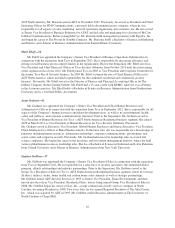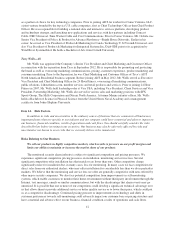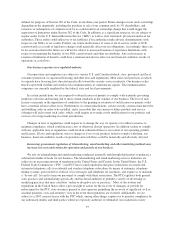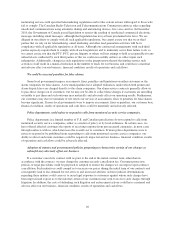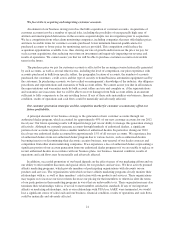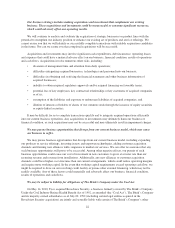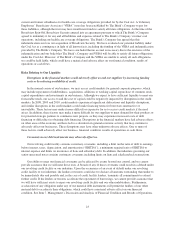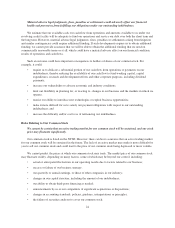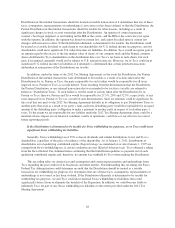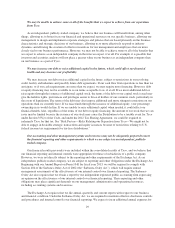ADT 2012 Annual Report Download - page 111
Download and view the complete annual report
Please find page 111 of the 2012 ADT annual report below. You can navigate through the pages in the report by either clicking on the pages listed below, or by using the keyword search tool below to find specific information within the annual report.defined for purposes of Section 382 of the Code, in any three-year period. Future changes in our stock ownership,
depending on the magnitude, including the purchase or sale of our common stock by 5% shareholders, and
issuances or redemptions of common stock by us could result in an ownership change that would trigger the
imposition of limitations under Section 382 of the Code. In addition, as a significant taxpayer, we are subject to
regular audits by the U.S. Internal Revenue Service (“IRS”) as well as state, territorial, provincial and local tax
authorities. These audits could subject us to tax liabilities if tax authorities make adverse determinations with
respect to our NOLs or tax credits. Further, any future disallowance of some or all of our tax credits or NOL
carryforwards as a result of legislative change could materially affect our tax obligations. Accordingly, there can
be no assurance that in the future we will not be subject to increased taxation or experience limitations with
respect to recognizing the benefits of our NOL carryforwards and other tax attributes. Any such increase in
taxation or limitation of benefits could have a material and adverse affect on our financial condition, results of
operations or cash flows.
Our business operates in a regulated industry.
Our operations and employees are subject to various U.S. and Canadian federal, state, provincial and local
consumer protection, occupational licensing and other laws and regulations. Most states and provinces in which
we operate have licensing laws directed specifically toward the security services industry. Our business relies
heavily upon both wireline and wireless telecommunications to communicate signals. Telecommunications
companies are currently regulated by the federal, state and local governments.
In certain jurisdictions, we are required to obtain licenses or permits to comply with standards governing
employee selection and training and to meet certain standards in the conduct of our business. The loss of such
licenses or permits or the imposition of conditions to the granting or retention of such licenses or permits could
have a material adverse effect on us. Furthermore, in certain jurisdictions, certain security systems must meet fire
and building codes in order to be installed, and it is possible that our current or future products and service
offerings will fail to meet such codes, which could require us to make costly modifications to our products and
services or to forgo marketing in certain jurisdictions.
Changes in laws or regulations could require us to change the way we operate or to utilize resources to
maintain compliance, which could increase costs or otherwise disrupt operations. In addition, failure to comply
with any applicable laws or regulations could result in substantial fines or revocation of our operating permits
and licenses. If laws and regulations were to change or if we or our products failed to comply with them, our
business, financial condition, results of operations and cash flows could be materially and adversely affected.
Increasing government regulation of telemarketing, email marketing and other marketing methods may
increase our costs and restrict the operation and growth of our business.
We rely on telemarketing and email marketing conducted internally and through third parties to generate a
substantial number of leads for our business. The telemarketing and email marketing services industries are
subject to an increasing amount of regulation in the United States and Canada. In the United States, the U.S.
Federal Trade Commission (“FTC”) and FCC have issued regulations that place restrictions on unsolicited
automated telephone calls to residential and wireless telephone subscribers by means of automatic telephone
dialing systems, prerecorded or artificial voice messages and telephone fax machines, and require us to maintain
a “do not call” list and to train our personnel to comply with these restrictions. The FTC regulates both general
sales practices and telemarketing specifically and has broad authority to prohibit a variety of advertising or
marketing practices that may constitute “unfair or deceptive acts or practices.” Most of the statutes and
regulations in the United States allow a private right of action for the recovery of damages or provide for
enforcement by the FTC, state attorneys general or state agencies permitting the recovery of significant civil or
criminal penalties, costs and attorneys’ fees in the event that regulations are violated. Additionally, we are
subject to a 2007 consent decree with the FTC which, among other things, requires us to monitor compliance by
our authorized dealers and third parties whom we expressly authorize to telemarket our residential security
19



